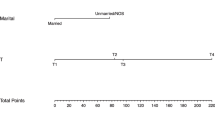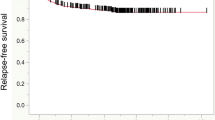Abstract
Objective
To predict cancer-specific survival, a refined nomogram model and brand-new risk-stratifying system were established to classify the risk levels of patients with early-onset locally advanced colon cancer (LACC).
Methods
The clinical factors and survival outcomes of LACC cases from the SEER database from 2010 to 2019 were retrieved retrospectively. Early-onset and late-onset colon cancer were grouped according to the age (50 years old) at diagnosis. Differences between groups were compared to identify mutual significant variables. A multivariate Cox regression analysis was further performed and then constructed a nomogram. We compared it with the AJCC-TNM system. The external validation was performed for evaluation. Finally, a risk-stratifying system of patients with early-onset LACC was established.
Results
A total of 32,855 LACC patients were enrolled in, 4548 (13.84%) patients were included in the early-onset LACC group, and 28,307 (86.16%) patients were included in the late-onset LACC group. The external validation set included 228 early-onset LACC patients. Early-onset colon cancers had poorer prognosis (T4, N2, TNM stage III, CEA, tumor deposit, and nerve invasion), and a higher proportion received radiotherapy and systemic therapy (P<0.001). In the survival analysis, cancer-specific survival (CSS) was better in patients with early-onset LACC than in those with late-onset LACC (P <0.001). This nomogram constructed based on the results of COX analysis showed better accuracy in CSS prediction of early-onset LACC patients than AJCC-TNM system in the training set and external validation set (0.783 vs 0.728; 0.852 vs 0.773).
Conclusion
We developed a novel nomogram model to predict CSS in patients with early-onset LACC it provided a reference in prognosis prediction and selection of individualized treatment, helping clinicians in decision-making.





Similar content being viewed by others
Availability of data and materials
The data presented in this study are available on reasonable request.
References
Song M (2022) Global epidemiology and prevention of colorectal cancer. Lancet Gastroenterol Hepatol 7(7):588–90. https://doi.org/10.1016/s2468-1253(22)00089-9. [publishedOnlineFirst:2022/04/11]
Sung H, Ferlay J, Siegel RL et al (2021) Global Cancer Statistics 2020: GLOBOCAN estimates of incidence and mortality worldwide for 36 cancers in 185 countries. CA: Cancer J Clin 71(3):209–249. https://doi.org/10.3322/caac.21660. [published Online First: 2021/02/05]
Saad El Din K, Loree JM, Sayre EC et al (2020) Trends in the epidemiology of young-onset colorectal cancer: a worldwide systematic review. BMC Cancer 20(1):288. https://doi.org/10.1186/s12885-020-06766-9. [published Online First: 2020/04/08]
Siegel RL, Fedewa SA, Anderson WF et al (2017) Colorectal cancer incidence patterns in the United States, 1974-2013. J Natl Cancer Inst 109(8). https://doi.org/10.1093/jnci/djw322. [published Online First: 2017/04/05]
Siegel RL, Miller KD, Fuchs HE et al (2022) Cancer statistics, 2022. CA: Cancer J Clin 72(1):7-33. https://doi.org/10.3322/caac.21708. [published Online First: 2022/01/13]
Bailey CE, Hu CY, You YN et al (2015) Increasing disparities in the age-related incidences of colon and rectal cancers in the United States, 1975–2010. JAMA Surg 150(1):17–22. https://doi.org/10.1001/jamasurg.2014.1756. [publishedOnlineFirst:2014/11/06]
Araghi M, Soerjomataram I, Bardot A et al (2019) Changes in colorectal cancer incidence in seven high-income countries: a population-based study. Lancet Gastroenterol Hepatol 4(7):511–18. https://doi.org/10.1016/s2468-1253(19)30147-5. [publishedOnlineFirst:2019/05/21]
Scarinci A, Di Cesare T, Cavaniglia D et al (2018) The impact of log odds of positive lymph nodes (LODDS) in colon and rectal cancer patient stratification: a single-center analysis of 323 patients. Updates Surg 70(1):23–31. https://doi.org/10.1007/s13304-018-0519-3. [publishedOnlineFirst:2018/03/04]
Sun Z, Xu Y, de Li M et al (2010) Log odds of positive lymph nodes: a novel prognostic indicator superior to the number-based and the ratio-based N category for gastric cancer patients with R0 resection. Cancer 116(11):2571–80. https://doi.org/10.1002/cncr.24989. [publishedOnlineFirst:2010/03/26]
Wang J, Hassett JM, Dayton MT et al (2008) The prognostic superiority of log odds of positive lymph nodes in stage III colon cancer. J Gastrointest Surg: Off J Soc Surg Alimentary Tract 12(10):1790–6. https://doi.org/10.1007/s11605-008-0651-3. [publishedOnlineFirst:2008/08/19]
Liu M, Zhang P, Wang S et al (2023) Comparation between novel online models and the AJCC 8th TNM staging system in predicting cancer-specific and overall survival of small cell lung cancer. Front Endocrinol 14:1132915. https://doi.org/10.3389/fendo.2023.1132915. [publishedOnlineFirst:2023/08/10]
Zhou H, Li XX, Huang YP et al (2023) Prognosis prediction and comparison between pancreatic signet ring cell carcinoma and pancreatic duct adenocarcinoma: a retrospective observational study. Front Endocrinol 14:1205594. https://doi.org/10.3389/fendo.2023.1205594. [publishedOnlineFirst:2023/08/03]
Niu X, Chang T, Yang Y et al (2023) Prognostic nomogram models for predicting survival probability in elderly glioblastoma patients. J Cancer Res Clin Oncol. https://doi.org/10.1007/s00432-023-05232-w. [publishedOnlineFirst:2023/08/08]
Liu F, Wang LL, Liu XR et al (2023) Risk factors for radical rectal cancer surgery with a temporary stoma becoming a permanent stoma: a pooling up analysis. J Laparoendosc Adv Surg Tech A 33(8):743–49. https://doi.org/10.1089/lap.2023.0119. [publishedOnlineFirst:2023/04/26]
Dong B, Chen Y, Lyu G (2022) Prognostic nomograms for predicting overall survival and cancer-specific survival of patients with very early-onset colorectal cancer: a population-based analysis. Bosn J Basic Med Sci 22(5):803–17. https://doi.org/10.17305/bjbms.2021.7035. [publishedOnlineFirst:2022/03/30]
Liang Z, Xiang D, Feng J et al (2023) Log odds of positive lymph nodes show better predictive performance on the prognosis of early-onset colorectal cancer. Int J Colorectal Dis 38(1):192. https://doi.org/10.1007/s00384-023-04490-x. [publishedOnlineFirst:2023/07/11]
Liu Y, Sun Z, Guo Y et al (2023) Construction and validation of a nomogram of risk factors and cancer-specific survival prognosis for combined lymphatic metastases in patients with early-onset colorectal cancer. Int J Colorectal Dis 38(1):128. https://doi.org/10.1007/s00384-023-04432-7. [publishedOnlineFirst:2023/05/15]
Muzny DM, Bainbridge MN, Chang K et al (2012) Comprehensive molecular characterization of human colon and rectal cancer. Nature 487(7407):330–337. https://doi.org/10.1038/nature11252. [published Online First: 2012/07/20]
Lyu HG, Haider AH, Landman AB et al (2019) The opportunities and shortcomings of using big data and national databases for sarcoma research. Cancer 125(17):2926–34. https://doi.org/10.1002/cncr.32118. [publishedOnlineFirst:2019/05/16]
Weiser MR (2018) AJCC 8th Edition: Colorectal Cancer. Ann Surg Oncol 25(6):1454–55. https://doi.org/10.1245/s10434-018-6462-1. [publishedOnlineFirst:2018/04/05]
Zhu L, Li T, Yang Y et al (2022) Development and validation of a nomogram for predicting post-operative abdominal infection in patients undergoing pancreaticoduodenectomy. Clin Chim Acta Int J Clin Chem 534:57–64. https://doi.org/10.1016/j.cca.2022.07.003. [published Online First: 2022/07/15]
Tsuruta H, Bax L (2006) Polychotomization of continuous variables in regression models based on the overall C index. BMC Med Inform Decis Mak 6:41. https://doi.org/10.1186/1472-6947-6-41. [publishedOnlineFirst:2006/12/16]
Vickers AJ, Holland F (2021) Decision curve analysis to evaluate the clinical benefit of prediction models. Spine J Off J N Am Spine Soc J 21(10):1643–48. https://doi.org/10.1016/j.spinee.2021.02.024. [publishedOnlineFirst:2021/03/07]
Tamas K, Walenkamp AM, de Vries EG et al (2015) Rectal and colon cancer: not just a different anatomic site. Cancer Treat Rev 41(8):671–9. https://doi.org/10.1016/j.ctrv.2015.06.007. [publishedOnlineFirst:2015/07/07]
Greene FL (2007) Current TNM staging of colorectal cancer. Lancet Oncol 8(7):572–3. https://doi.org/10.1016/s1470-2045(07)70185-7. [publishedOnlineFirst:2007/07/07]
Chao C, Mei K, Wang M et al (2023) Construction and validation of a nomogram based on the log odds of positive lymph nodes to predict cancer-specific survival in patients with small cell lung cancer after surgery. Heliyon 9(8):e18502. https://doi.org/10.1016/j.heliyon.2023.e18502. [publishedOnlineFirst:2023/08/02]
Pei JP, Zhang CD, Liang Y et al (2020) Novel nomograms individually predicting overall survival of non-metastatic colon cancer patients. Front Oncol 10:733. https://doi.org/10.3389/fonc.2020.00733. [publishedOnlineFirst:2020/05/22]
Yi X, Zhu B, Zhang J et al (2023) Novel model for cancer-specific survival of patients with pulmonary sarcomatoid carcinoma: a population based analysis and external validation. Asian J Surg. https://doi.org/10.1016/j.asjsur.2023.07.002. [publishedOnlineFirst:2023/08/04]
Zhang X, Hu Y, Deng K et al (2023) Developing prognostic nomograms to predict overall survival and cancer-specific survival in synchronous multiple primary colorectal cancer based on the SEER database. J Cancer Res Clin Oncol. https://doi.org/10.1007/s00432-023-05221-z. [publishedOnlineFirst:2023/08/07]
Done JZ, Fang SH (2021) Young-onset colorectal cancer: a review. World J Gastrointest Oncol 13(8):856–66. https://doi.org/10.4251/wjgo.v13.i8.856. [publishedOnlineFirst:2021/08/31]
Quah HM, Joseph R, Schrag D et al (2007) Young age influences treatment but not outcome of colon cancer. Ann Surg Oncol 14(10):2759–65. https://doi.org/10.1245/s10434-007-9465-x. [publishedOnlineFirst:2007/06/27]
Jacobs D, Zhu R, Luo J et al (2018) Defining early-onset colon and rectal cancers. Front Oncol 8:504. https://doi.org/10.3389/fonc.2018.00504. [publishedOnlineFirst:2018/11/22]
Manjelievskaia J, Brown D, McGlynn KA et al (2017) Chemotherapy use and survival among young and middle-aged patients with colon cancer. JAMA Surg 152(5):452–59. https://doi.org/10.1001/jamasurg.2016.5050. [publishedOnlineFirst:2017/01/26]
Saraste D, Järås J, Martling A (2020) Population-based analysis of outcomes with early-age colorectal cancer. Br J Surg 107(3):301–09. https://doi.org/10.1002/bjs.11333. [publishedOnlineFirst:2020/01/12]
Li Y, Liu W, Zhou Z et al (2020) Development and validation of prognostic nomograms for early-onset locally advanced colon cancer. Aging 13(1):477–92. https://doi.org/10.18632/aging.202157. [publishedOnlineFirst:2020/12/09]
Aurello P, Petrucciani N, Nigri GR et al (2014) Log odds of positive lymph nodes (LODDS): what are their role in the prognostic assessment of gastric adenocarcinoma? Journal of gastrointestinal surgery : official journal of the Society for Surgery of the Alimentary Tract 18(7):1254–60. https://doi.org/10.1007/s11605-014-2539-8. [publishedOnlineFirst:2014/05/21]
Fortea-Sanchis C, Martínez-Ramos D, Escrig-Sos J (2018) The lymph node status as a prognostic factor in colon cancer: comparative population study of classifications using the logarithm of the ratio between metastatic and nonmetastatic nodes (LODDS) versus the pN-TNM classification and ganglion ratio systems. BMC Cancer 18(1):1208. https://doi.org/10.1186/s12885-018-5048-4. [publishedOnlineFirst:2018/12/06]
Huang B, Ni M, Chen C et al (2017) LODDS is superior to lymph node ratio for the prognosis of node-positive rectal cancer patients treated with preoperative radiotherapy. Tumori 103(1):87–92. https://doi.org/10.5301/tj.5000560. [publishedOnlineFirst:2016/10/30]
Prassas D, Safi SA, Stylianidi MC et al (2022) N, LNR or LODDS: which is the most appropriate lymph node classification scheme for patients with radically resected pancreatic cancer? Cancers 14(7). https://doi.org/10.3390/cancers14071834. [published Online First: 2022/04/13]
Cappellesso R, Luchini C, Veronese N et al (2017) Tumor budding as a risk factor for nodal metastasis in pT1 colorectal cancers: a meta-analysis. Human Pathol 65:62–70. https://doi.org/10.1016/j.humpath.2017.04.013. [publishedOnlineFirst:2017/04/26]
Lugli A, Kirsch R, Ajioka Y et al (2017) Recommendations for reporting tumor budding in colorectal cancer based on the International Tumor Budding Consensus Conference (ITBCC) 2016. Mod Pathol Off J US Canad Acad Pathol Inc 30(9):1299–1311. https://doi.org/10.1038/modpathol.2017.46. [published Online First: 2017/05/27]
Maffeis V, Nicolè L, Cappellesso R (2019) RAS, Cellular plasticity, and tumor budding in colorectal cancer. Front Oncol 9:1255. https://doi.org/10.3389/fonc.2019.01255. [publishedOnlineFirst:2019/12/06]
Trinh A, Lädrach C, Dawson HE et al (2018) Tumour budding is associated with the mesenchymal colon cancer subtype and RAS/RAF mutations: a study of 1320 colorectal cancers with Consensus Molecular Subgroup (CMS) data. Br J Cancer 119(10):1244–51. https://doi.org/10.1038/s41416-018-0230-7. [publishedOnlineFirst:2018/11/06]
Funding
This study was sponsored by Yangzhou City Science and Technology Project (Funding No.YZ2020159).
Author information
Authors and Affiliations
Contributions
Bangquan Chen and Yue Ma organized the study data, assisted in data analysis, and wrote the first draft of the paper. Jiajie Zhou and Wenhao Yu conceptualized and designed the study. Shuyang Gao, Yapeng Yang, and Bangquan Chen collected the data and performed the statistical analysis. Jun Ren, Yong Wang and Daorong Wang revised the article. All authors have read and agreed to the published version of the manuscript.
Corresponding author
Ethics declarations
Ethical approval
Ethical approval was obtained from the original studies. This article does not contain any studies with human participants or animals performed by any of the authors.
Competing interests
The authors declare no competing interests.
Additional information
Publisher's Note
Springer Nature remains neutral with regard to jurisdictional claims in published maps and institutional affiliations.
Rights and permissions
Springer Nature or its licensor (e.g. a society or other partner) holds exclusive rights to this article under a publishing agreement with the author(s) or other rightsholder(s); author self-archiving of the accepted manuscript version of this article is solely governed by the terms of such publishing agreement and applicable law.
About this article
Cite this article
Chen, B., Ma, Y., Zhou, J. et al. Predicting survival and prognosis in early-onset locally advanced colon cancer: a retrospective observational study. Int J Colorectal Dis 38, 250 (2023). https://doi.org/10.1007/s00384-023-04543-1
Accepted:
Published:
DOI: https://doi.org/10.1007/s00384-023-04543-1




